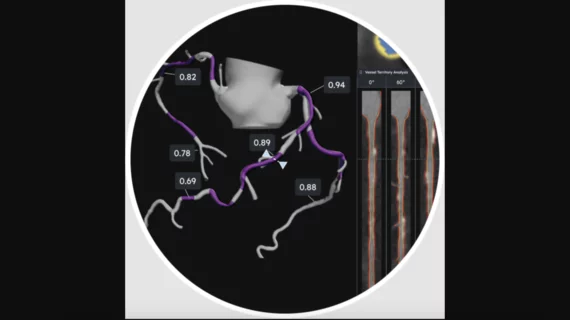New Category I CPT code issued for AI-enabled coronary plaque analysis software
The American Medical Association (AMA) has issued a new Category I CPT code for artificial intelligence (AI) platforms that quantify coronary plaque buildup in imaging results and identify signs of coronary artery disease (CAD). The update, scheduled to take effect in January 2026, covers AI offerings from multiple companies, including HeartFlow, Cleerly and Elucid. These technologies work by evaluating coronary CT angiography images and then alerting clinicians of any findings that represent an increased risk of CAD.
California-based HeartFlow was quick to issue a statement celebrating this decision. The company’s Plaque Analysis has gained significant momentum in recent years, and it just launched the latest version of that software in July at the Society of Cardiovascular Computed Tomography annual meeting.
“We commend the AMA’s issuance of this upgraded Category I CPT billing code, which validates the technology’s clinical value in quantifying and characterizing plaque to help assess risk and personalize treatment for patients with coronary artery disease,” Campbell Rogers, MD, chief medical officer of HeartFlow, said in the statement. “It has been shown that with HeartFlow’s Plaque Analysis, two out of three patients had their medical management changed and more precisely tailored, which could contribute to better treatment decisions and improved outcomes.”
Cleerly also shared its excitement over the AMA decision.
“Our team at Cleerly initiated this process with AMA more than five years ago, and we could not be more thankful to the many societies and physicians that have supported us in the process,” James K. Min, MD, founder and CEO of Cleerly, told Cardiovascular Business. “AMA takes great care in considering the codes it issues and we are so appreciative for the recognition of the strength of the Cleerly clinical evidence and utilization data that have proved its value.”
Elucid, meanwhile, said the news was encouraging.
"We remain cautiously optimistic as we await final publication of the code, effective Jan. 1, 2026," Kelly Huang, PhD, CEO of Elucid, told Cardiovascular Business. "We recognize the efforts of the societies and physician organizations working alongside the AMA and look forward to continued collaboration to support efforts toward improving patient outcomes."
Additional context about the new CPT code
Some of these AI-enabled offerings were previously covered by a Category III CPT code, which are intended to be temporary until additional data can be collected. Category I CPT codes, meanwhile, are permanent and set aside for established medical procedures, technologies and services.
For now, the new CPT code for these AI-enabled technologies is 75XX6. It will be updated to a full number closer to the time it is put into effect.
AMA representatives made their decision to add the new code during a monthly panel. A full summary of that panel, including other significant updates, is available here.
Announcement comes days after CMS expanded Medicare coverage for these platforms
October has been a historic month for AI-powered coronary plaque analysis. Just days ago, the Centers for Medicare and Medicaid Services (CMS) finalized a new local coverage determination (LCD) that expanded Medicare coverage for these same technologies. Four of seven Medicare Administrative Contractors (MACs) agreed to the updated policy, which goes into effect on Nov. 24.
“We commend the MACs for recognizing the value and critical role of AI-enabled plaque quantification technologies in cardiovascular disease management,” John Farquhar, HeartFlow’s CEO, said at the time. “Medicare’s coverage of HeartFlow Plaque Analysis is a significant step forward for cardiovascular disease diagnosis and treatment, expanding access for patients who will see great benefit from more targeted and effective interventions.”
Read prior Cardiovascular Business coverage of the recent LCD here and here.

